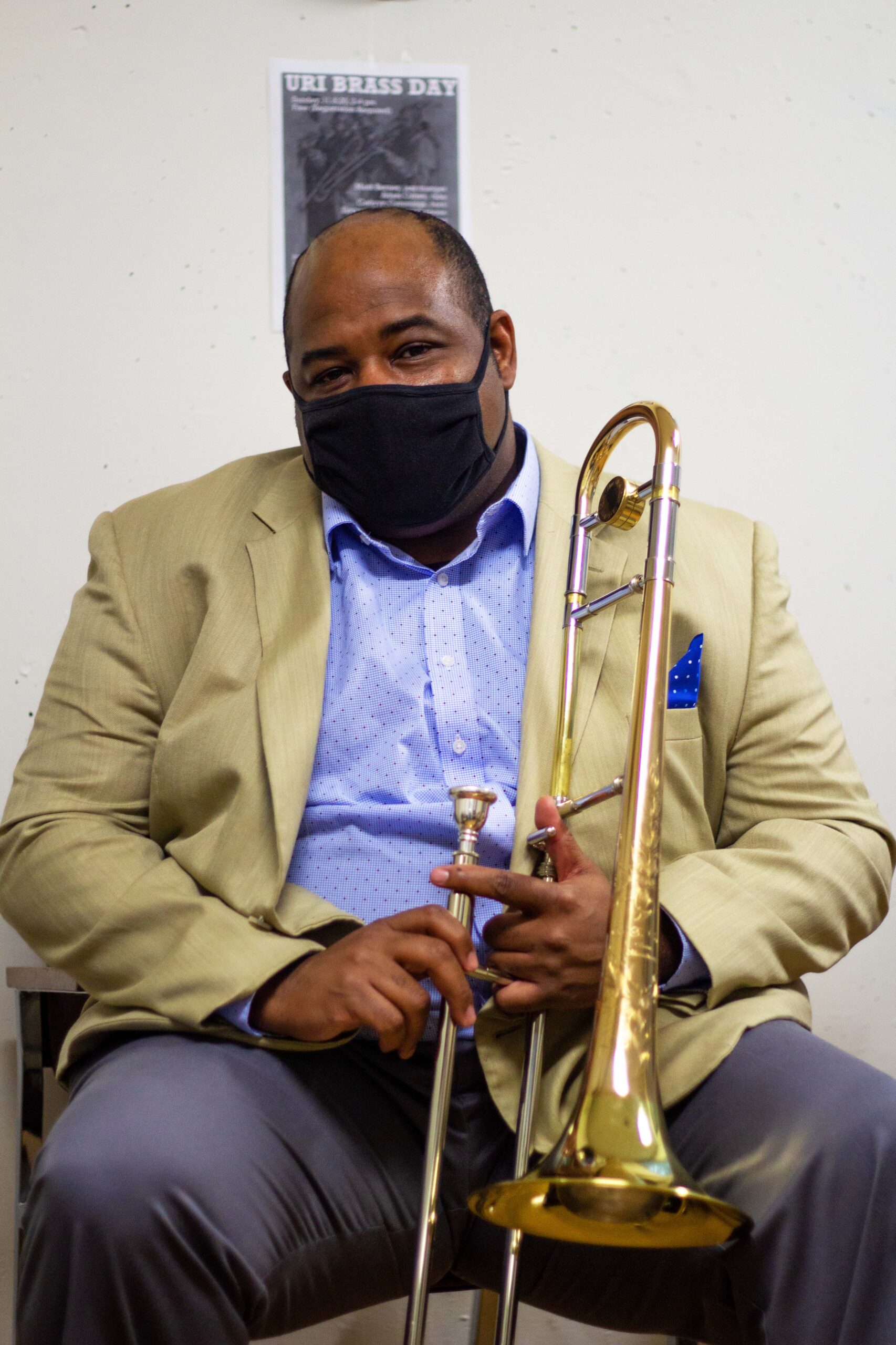Music professor teaches about protest music
URI Professor Emmett Goods discusses the history of music as a form of protest. Photo by Greg Clark.
Emmett Goods said he remembers his grandfather grabbing him by the back of his shirt in church as a child, making him stand to show respect for the hymn “Lift Every Voice and Sing.” Before he even knew the song’s significance, Goods was singing protest music.
“Sing a song full of the faith that the dark past has taught us / Sing a song full of the hope that the present has brought us / Facing the rising sun of our new day begun / Let us march on till victory is won,” James Weldon Johnson wrote in 1900.
Today, it’s known as the Black national anthem.
“I didn’t understand the fact, as a young child, that that was my people’s way of trying to claim their American identity,” Goods said. “That the so-called national anthem did not necessarily include me and my people as full citizens of the United States.”
As an assistant professor in the department of music at the University of Rhode Island, Goods teaches MUS 301: Music as a Form of Social Protest. In the class, his students analyze lyrics from songs like “Lift Every Voice and Sing;” songs he calls protest songs.
This semester’s class has focused on hip hop, but Goods said that protest songs go as far back as the days of slavery, when African Americans would hide their protests through singing Bible songs to the music we associate with the Black Lives Matter movement today.
“While we go to music for a bit of escapism and release and enjoyment, sometimes there’s another message there and I hope that [my students] have the tools that they need to hear music in a way to fully understand what the artist is trying to portray,” Goods said.
Goods acknowledged that protest songs can come in many forms from the outright revolutionary “Say It Loud — I’m Black and I’m Proud” by James Brown to the comforting, yet still revolutionary classic Sam Cooke song, “A Change is Gonna Come.” He even ventured into country music with singers like Reese Palmer and Mickey Guyton, both Black female country artists. Societal issues from race to feminism are touched upon through music.
However, like many other forms of protest and storytelling, these artists have faced suppression of their work and have struggled in getting their messages across.
When Cooke first released “A Change is Gonna Come” in 1964, the final verse, in which he sings, “Then I go to my brother / And I say, ‘Brother, help me please’ / But he winds up / Knocking me / Back down on my knees,” was cut by his record company for being too controversial. Over 40 years later in 2007, Palmer’s hit song “Country Girl” had a verse about being a Black woman taken out by her own record label.
Still, artists have persisted and continue to make their protest music, which continues to impact us today.
As part of Goods’ class, students will complete a closing presentation in which they choose a social protest song that they’ve connected with personally and share their own political and social concerns. Vilde Aaslid, an assistant professor of music, said that Goods often comes into her office to share what he’s learned from his students and their presentations.
“He provides his students with really, almost like a new set of ears for hearing music that they care about,” Aaslid said. “That’s something that I see him consistently doing throughout his work in the department, and in his creative work too, is to constantly be reinforcing the cultural import of the music.”
Aaslid noted that the social and cultural import of music has not gotten the attention it needs in music departments in higher education. She believes that Goods and MUS 301 accelerate a necessary change for the department, in an effort to show that music can be deployed as a tool for social change in a deep, powerful way.
While it is listed as a music class, the class crosses into multiple disciplines. Marcus Nevius, an assistant professor in the Africana studies department, finds the class to be an excellent example of the power and impact a multidisciplinary class can have on students, given Goods’ knowledge in both music and 20th century African American history in particular.
“It really puts him in the vanguard of scholars in an Africana Studies context, but also in his context of the department of music as well,” Nevius said.

